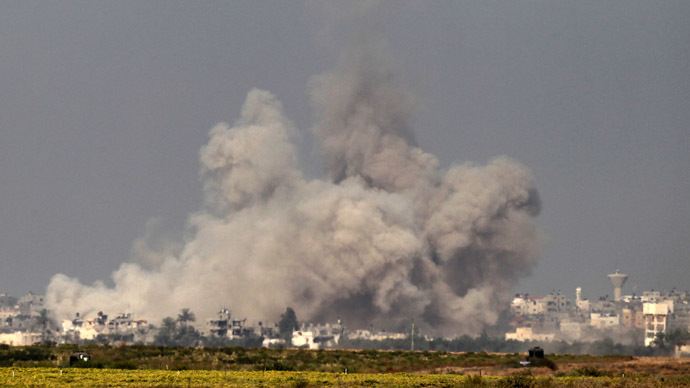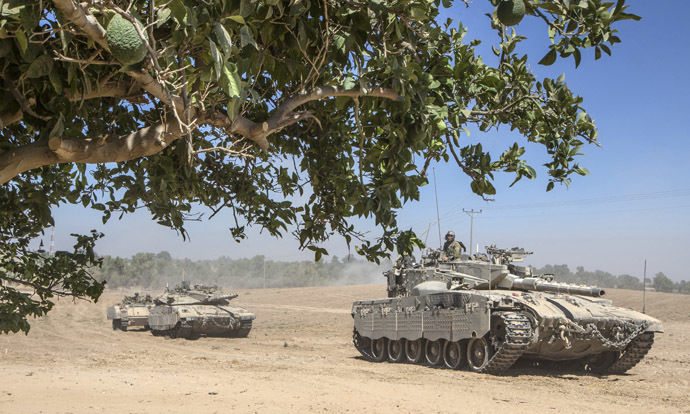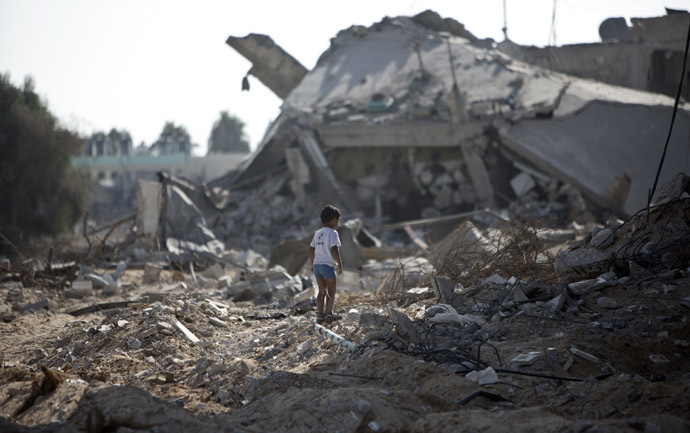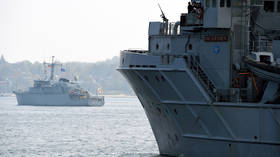‘Bibi’ does Gaza or the long and winding road to Tehran via the Mediterranean

The Israeli assault on the miniscule Gaza Strip known as Operation Protective Edge has now been going strong for more than three weeks, and Benjamin Netanyahu (Bibi) came out last Monday to warn his constituents to be ready for a "prolonged" operation.
On the same day, the UN Office for the Coordination of Humanitarian Affairs (OCHA) released a video on YouTube entitled "Gaza emergency 2014", detailing the damage and destruction that has so far been done by the Israel Defense Forces (IDF): almost 1,100 Palestinians have been killed so far (now it’s almost 1,400). 75% of these fatalities were characterized as "civilians" and 30% were children, dead children. In addition, more than 6,200 Palestinians have been injured, approximately a third of whom are children.
The IDF has also declared that 44% of Gaza Strip territory is now off-limits as a "buffer zone".
The IDF offensive has so far destroyed or severely damaged 3,600 homes, displacing approximately 200,000 people in the process. These now-homeless Gazans mostly seek and find refuge in schools. But the IDF attack has also damaged 130 schools and 22 health facilities, farms, and fishing equipment (thereby directly targeting the inhabitants' livelihoods and healthcare).
Another outcome of the assault is the fact that Gazans can only count on about 4 hours of electricity per day. In fact, the Egyptian-American NBC News journalist Ayman Mohyeldin tweeted in the wee hours of Tuesday (29 July) that "[t]onight #gaza is dark due to power outages, [but] lit up by Israeli flares. The eerily quiet [is] accompanied by Israeli drones & frequent explosions.” At that time, the IDF was conducting "one of the heaviest bombardments in the three-week conflict,” destroying Gaza's only power plant and thereby turning electricity (a prerequisite for modern life anywhere) into an inaccessible commodity and thus covering Gaza in darkness.
The assistant professor of political science at Gaza's Al Azhar University Mkhaimer Abusada subsequently made this bleak remark: "[w]ith the power station gone, all of Gaza is going to collapse ... They're trying to put direct pressure on the Palestinians.”
It now appears as if Bibi started Operation Protective Edge to bring a final solution to the 7-year sea, air, and land blockade of the tiny slither of land caught between Egypt and Israel, as if the ostensible object of exterminating the Gazans by means of this slow process of attrition suddenly turned out to be just a little too drawn out and time-consuming.

Gas interests
Even though the initial impetus for starting Operation Protective Edge was the killing of three hapless Jewish teenagers, the official Israeli rhetoric (as well as the mainstream media's focus) turned to the rockets launched from Gaza. And now, Bibi and his IDF henchmen are happily citing Hamas-built tunnels (used to get hold of much-needed supplies, but arguably also to launch terrorist attacks) as constituting another reason for relentlessly shelling and attacking the tiny Gaza Strip.
On Wednesday, 30 July, the IDF used its official twitter account to announce that "[o]ur forces have detonated three Hamas tunnel routes within Gaza in the past 24 hours.”
In the face of such a relentless onslaught, the organization of Hamas and its leadership appear determined and defiant. The leader of its Izz ad-Din al-Qassam Brigades, the 50-year-old Mohammed Deif even emerging from years in hiding to appear on television to deliver a statement. In a prerecorded message aired on Hamas' official channel (Al-Aqsa TV), the elusive Arab fighter said that the "cease fire will only happen if the aggression is ended and the blockade lifted. The Zionist entity [commonly known as Israel] will not enjoy security if our people do not live in freedom and with respect.”
Mohammed Deif thus repeated statements made by the 58-year old Khaled Mashal, the exiled leader of Hamas. Last week, Mashal spoke to the BBC's Stephen Sackur, stating that "[w]e want a ceasefire as soon as possible, that is parallel with the lifting of the siege on Gaza. This is the demand of the Gazan people,” adding that "[t]here should be a genuine guarantee to lift the siege in Gaza.” The Hamas leader also denounced Israel's lies about the whereabouts of rockets used to attack Israeli territory. He said that, rather than hide them in schools and other buildings, as claimed by the IDF in justifying their wanton destruction of Gazan property, Khaled Mashal declared that the Qassam rockets are kept underground, hidden from view and not detectable by random observers or the IDF. The Palestinian ended by asking "[w]hy are the people of Gaza being punished with a slow death in the world's biggest prison?"
I already wrote about Marine-1 and Marine-2 gas wells inside the Leviathan field and off the Gaza coast. These two gas wells should technically fall within the authority of Hamas, the democratically elected government of the Gaza Strip and currently part of the Palestinian unity government, abiding by the conditions stipulated by the EU and the US. Could it be that Israel, led by the notoriously hawkish and Iran-obsessed Bibi, is now actually implementing its own version of a final conclusion for the Palestinian problem in Gaza? According to the economist Dr. Hatice Karahan of Istanbul’s Bilgi University, "Israel's Gaza attacks are essentially linked to energy geopolitics," even calling the military intervention an "Energy Line Operation". Dr Karahan explains that "Gaza holds a total reserve of 38 billion cubic meters [of natural gas] in the two fields known as Marine-1 and Marine-2. In 1999 the Palestinian Authority allotted the British Gas Group (BG Group) the exclusive rights to prospect for natural gas in the area, and subsequently, upon the announcement that the company had found natural gas, the BG Group signed a 25-year agreement with the Consolidated Contractors Company, affiliated with the Palestinian Authority, and the Palestinian Investment Fund.”

She continues that the "inclusion of Hamas in this critical area was naturally a development counter to the interests of Israel. In fact, Israel could not allow Hamas to benefit from these profits and thus become an even bigger threat to Israel. As a result, as a solution, the decision was made to initiate a plan to get rid of Hamas. In consequence of these developments, in the course of December 2008, Israel started its Operation Cast Lead against Gaza, while at the same time trying to come to an agreement with the BG Group on the topic of the natural gas held by Gaza.”
The Turkish academic thus sees a straight line connecting Operation Cast Lead (2008) and Operation Protective Edge (2014), intimating that both operations ultimately serve the same purpose, namely to eject Hamas from the Gaza Strip and to give Israel direct access to the proceeds of the Marine-1 and Marine-2 gas wells. Ethnic cleansing for commercial purposes.
As an economist Karahan clearly recognizes the primacy of the commercial argument – after all it has always been about the oil.
At the same time, another layer of reasoning, that is not necessarily economic in nature, but instead dovetails perfectly with Bibi's personal obsessions, could also be seen lurking behind the scenes. Israel's Minister of Economy and Chairman of the Bayit Yehudi (Jewish Home) Party Naftali Bennett gave expression to this line of argument recently: the "Islamic Republic [of Iran] has been propping up terror groups on Israel’s border for years. If they are allowed to obtain a nuclear weapon, the results would be catastrophic. Israel's ongoing conflict with Hamas in the Gaza Strip has for the umpteenth time exposed Iran as the true source of instability in the Middle East." Bennett continued that "the terrorists against whom Israeli soldiers are fighting in Gaza are Palestinian, [but] they are in reality proxies of Iran located on our western border. Simply put—Israel is fighting Iran.”
In the end, one could thus put forward that Bibi's as-yet frustrated desire to attack Iran directly is now being put into place in the Gaza Strip, an area which could potentially hold many liquid benefits for Khaled Mashal and Mohammed Deif, strengthening their resolve and ability to fight Israel. In this way, the bloody assault on the tiny strip of land squeezed between Egypt and Israel could be seen as the IDF killing two birds with one stone.
The statements, views and opinions expressed in this column are solely those of the author and do not necessarily represent those of RT.
The statements, views and opinions expressed in this column are solely those of the author and do not necessarily represent those of RT.













